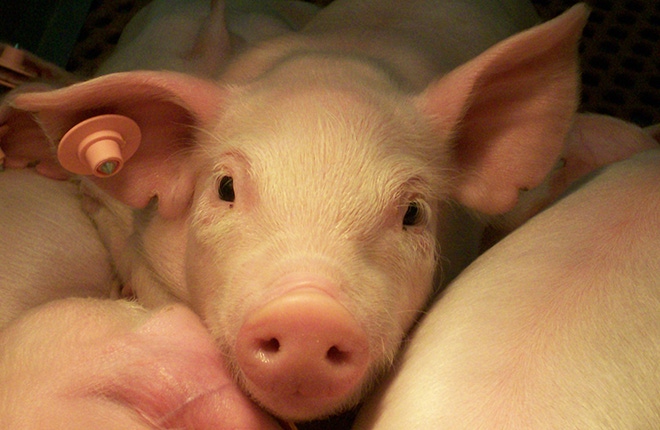Natural enzyme examined as antibiotics alternative
The results showed that piglets on lysozyme- or antibiotics-treated feeds grew approximately 12 percent faster than untreated pigs
May 29, 2015

Lysozyme, a naturally occurring antimicrobial enzyme, is used in food and beverage applications such as cheese- and wine-making. Now, it may also prove useful as an antibiotic alternative for improved feed efficiency and growth in pigs, according to studies by U.S. Department of Agriculture (USDA) scientists.
Their research coincides with ongoing debate over whether using antibiotics in this manner contributes to the emergence of resistant bacteria strains, threatening the compounds’ availability and effectiveness as infection-fighters in both veterinary and human medicine. Antibiotic-resistant bacteria sicken more than 2 million people in the United States each year and kill over 23,000 directly.
Swine producers are currently under pressure to eliminate sub-therapeutic antibiotic use throughout the production cycle, according to William Oliver, a physiologist at USDA’s Agricultural Research Service in Clay Center, Nebraska. Finding safe and effective alternatives to traditional antibiotics will give swine producers viable options in the event the antibiotics are removed from use, he added.
Oliver and his ARS and university colleagues began investigating lysozyme in 2010. In a recently published trial conducted at Clay Center, they compared the growth rates and weight gains of two groups of 600 piglets placed on one of three diet regimens: a standard feed regimen of corn/soybean meal and specialty protein, a second regimen of the same with lysozyme added, and a third containing the antibiotics chlortetracycline and tiamulin hydrogen fumarate rather than the lysozyme.
The groups were also kept in weaning pens that had either been disinfected or left uncleaned since the last group of animals had occupied them. The latter was done to stimulate chronic, or long-term, immune activity, including the production of cytokines, which divert nutrients away from growth in swine and result in slower weight gain.
The results showed that piglets on lysozyme- or antibiotics-treated feeds grew approximately 12 percent faster than untreated pigs—even in uncleaned pens, suggesting that the treatments successfully ameliorated the effects of indirect immune challenge in the animals.
Read more about this research in the May 2015 issue of AgResearch magazine. ARS is USDA’s principal intramural scientific research agency.
You May Also Like



